How Does Junior Change In Part Time Indian
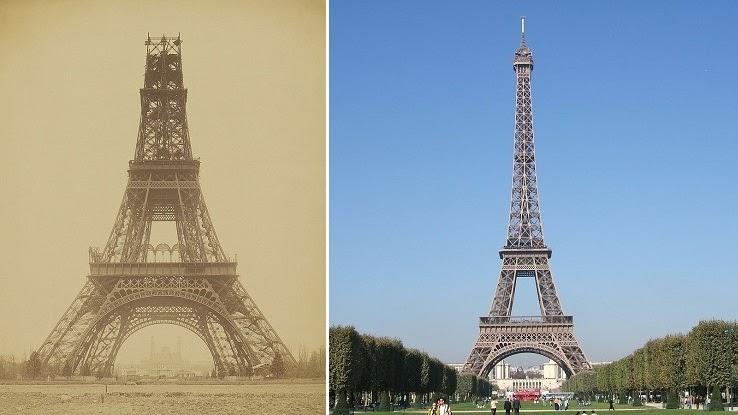
Landmark structures that were congenital to stand up the test of time were usually meticulously preserved over the years, allowing them to appear shut to the aforementioned equally they did when they were constructed. These buildings, monuments and other valuable cultural avails are establish all over the earth and attract millions of visitors each twelvemonth.
However, many famous landmarks no longer expect the same, either due to a lack of maintenance, natural disasters or human being intervention. These famous landmarks accept inverse significantly, sometimes making them hard to recognize.
Golden Gate Bridge, San Francisco
The Golden Gate Bridge is a famous landmark and a spectacle of engineering. Spanning 1.7 miles beyond the Gilt Gate strait that connects San Francisco with Marin County, the bridge supports more than 112,000 vehicles per twenty-four hour period.
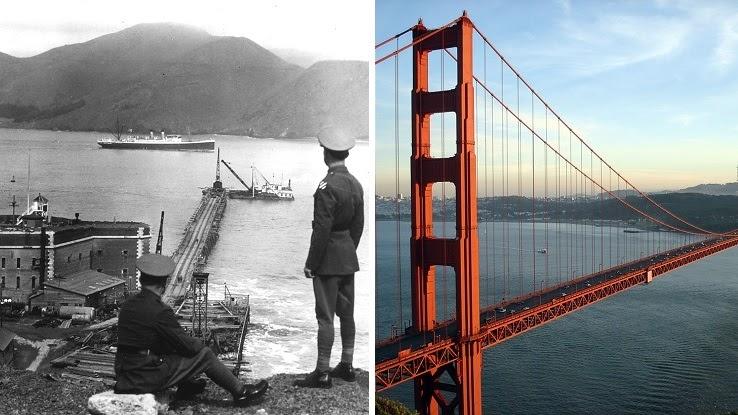
Chicago engineer Joseph Strauss designed the construction that took more than 4 years to complete. When it opened to traffic on May 27, 1937, the Golden Gate Bridge had the longest suspended bridge span in the globe. Stringent maintenance for more than fourscore years has helped the bridge resist turbulent waters, potent winds, a corrosive temper and earthquake forces.
In the urban center that never sleeps, Times Foursquare is a humming drove of Broadway theaters, cinemas, prominent restaurants and electronic billboards. Every New Twelvemonth'due south Eve, thousands assemble to spotter the magical New year's day'south brawl drop during the last threescore seconds before the new year begins.
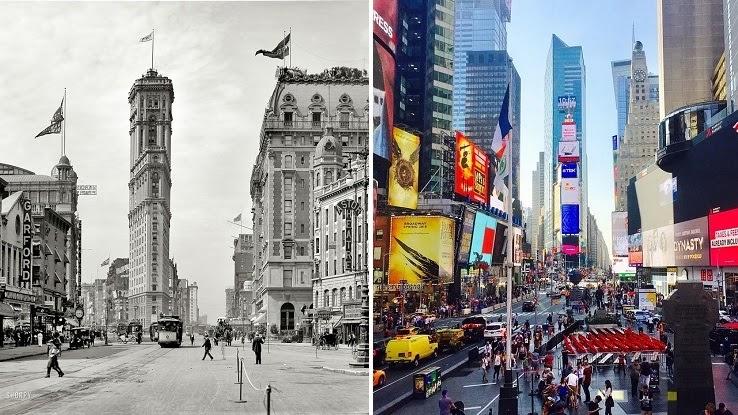
Initially called Long Acre Square, the name was inverse in 1905 when The New York Times congenital Times Tower, the city's second-largest edifice at the time. Over the past century, Times Foursquare has undergone numerous adjustments, including a difficult catamenia after the Neat Low. However, it has survived and is a popular tourist destination today.
Fremont Street, Las Vegas
In the last century, perhaps no other city has changed every bit much every bit Las Vegas. From a small desert town with a population of 2,400 in 1900, the Las Vegas Valley chop-chop became one of the fastest growing metropolitan areas in the U.s.a.. The population now numbers more 2.four 1000000.
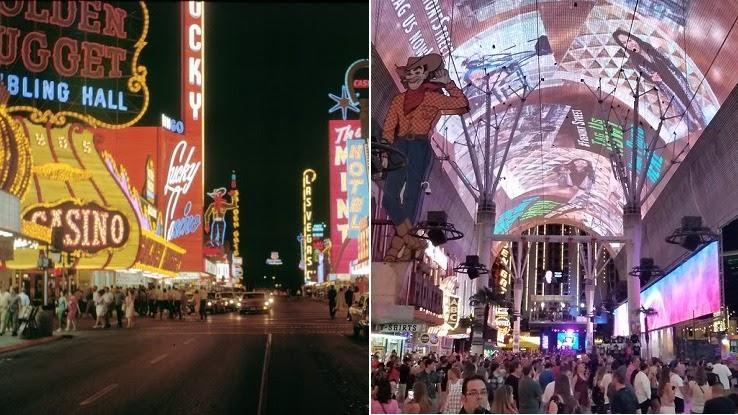
While the growth of Vegas can be attributed to gambling and the proliferation of casinos on the Strip, Fremont Street, the historical center and the first gambling district, has also evolved over time. Today, it's covered with a awning that offers an air-conditioned, vii-block pedestrian zone for visitors.
Great Sphinx, Giza
The Great Sphinx is the largest and most famous monolith statue in the world. The limestone construction sits next to the Great Pyramids of Giza in Egypt and depicts a mythical creature with a human head and the body of a king of beasts.
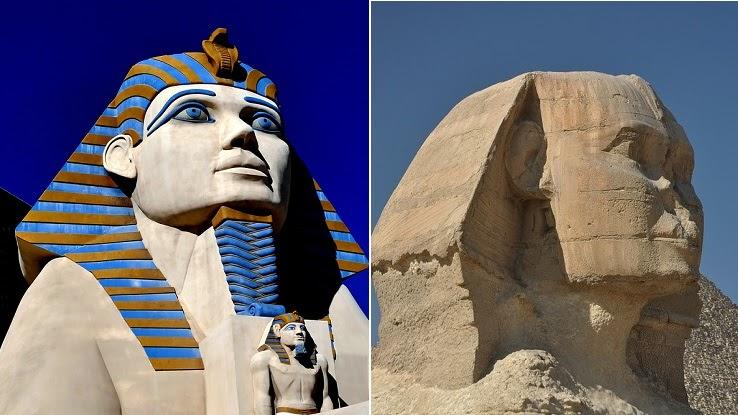
Although the precise age is not known, the drab, colorless sculpture shows the touch on that centuries of desert weather and vandalism have taken on the majestic figure. The recent discovery of paint on parts of the Sphinx fifty-fifty suggests that it was more colorful in its original celebrity days, equally shown past this replica built at the Luxor Hotel in Las Vegas.
Mount Rushmore, South Dakota
Beginning in 1927, sculptors spent xiv years etching the faces of U.S. Presidents Washington, Jefferson, Roosevelt (Teddy) and Lincoln into the side of a mountain in the Black Hills of South Dakota. Called by sculptor Gutzon Borglum, these presidents stand for the almost pregnant events in the country's history.
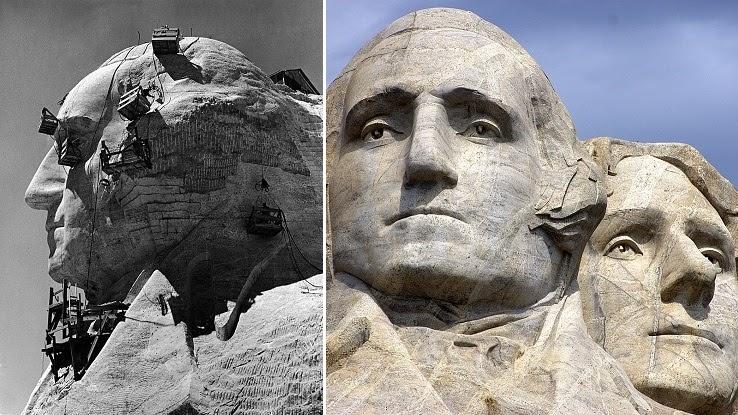
Dynamite was the selection for diggings the hard granite stone off the mount. A "honeycombing" procedure followed, which allowed pocket-size pieces to exist removed past hand. Thomas Jefferson was originally carved to the left of George Washington. However, the face croaky and had to exist removed. It was re-carved to the right of Washington.
The Brandenburg Gate, Berlin
Since its opening on August 6, 1791, the Brandenburg Gate has seen its share of historically significant events. It survived a conquest by Napoleon's soldiers, who stole the most distinctive feature, the Quadriga, and carried information technology back to France as a victory trophy. Information technology was later returned to Berlin after Napoleon's defeat.
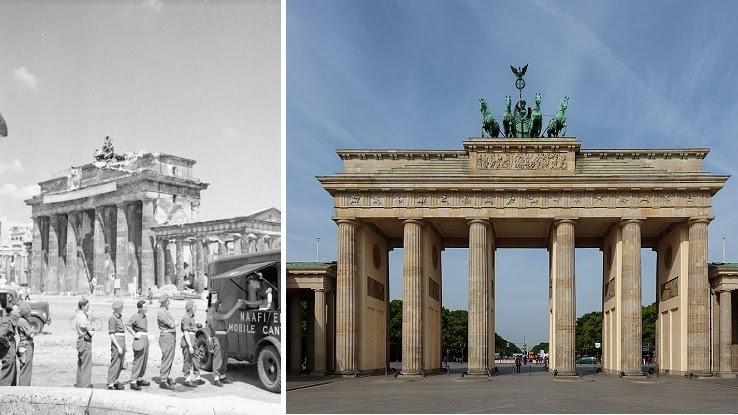
It was damaged during WWII and became role of the Berlin wall. Perhaps the most remembered event at the gate was Ronald Reagan's 1987 spoken communication in which he demanded, "Mr. Gorbachev, tear down this wall!" The gate ultimately became a symbol of liberty.
Madison Foursquare Garden, New York Metropolis
When Pennsylvania Station opened in 1910, information technology was widely praised for its magnificent architecture. It was the largest indoor space in New York City, with sunshine flooding into the sleeping accommodation through 1,500 anxiety of vaulted glass windows.
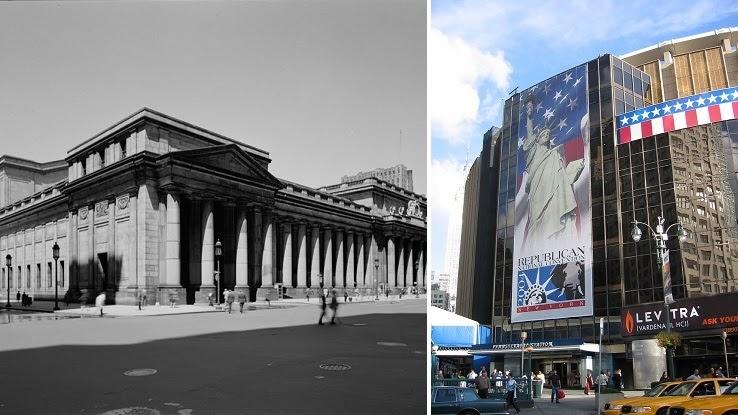
The purple building was mostly demolished in 1963 to make room for Pennsylvania Plaza and a new entertainment venue, Madison Square Garden. Today, trains yet run nether the Garden through the subterranean labyrinth that makes up the current Penn Station. Perhaps passengers can hear the cheer of basketball fans or the iconic lyrics from a concert while they wait for their train.
Dubai, United Arab Emirates
To declare that Dubai has gone through explosive growth would be an understatement. It went from a small cluster of settlements to a mod port, city and commercial hub fueled by the oil trade in record time. The city's ruler in one case declared, "Dubai will never settle for anything less than first place."
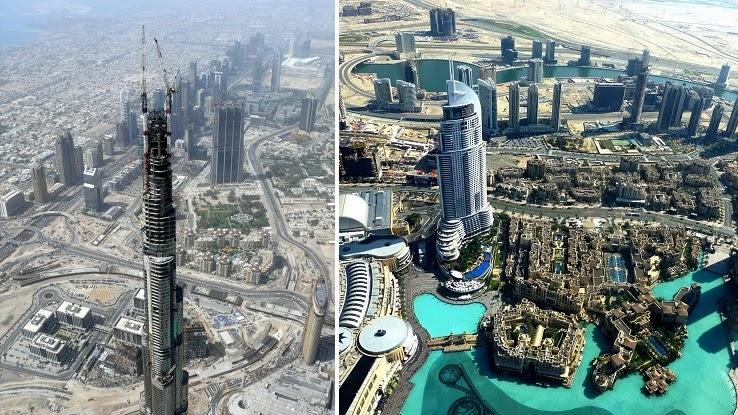
He demonstrated that goal by successfully transforming the urban center into a popular tourist destination with ultramodern architecture, luxury shopping, gourmet restaurants and a lively nightlife scene. What was once an most barren desert is at present the largest and most populous city in the United Arab Emirates.
Pompeii, Italy
Anyone who has studied Roman history knows that the aboriginal city of Pompeii was destroyed past the eruption of Mountain Vesuvius in 79 Advertisement. One time a destination for Rome's elite, the ruins remained covered until discovered by architect Domenico Fontana belatedly in the 16th century.
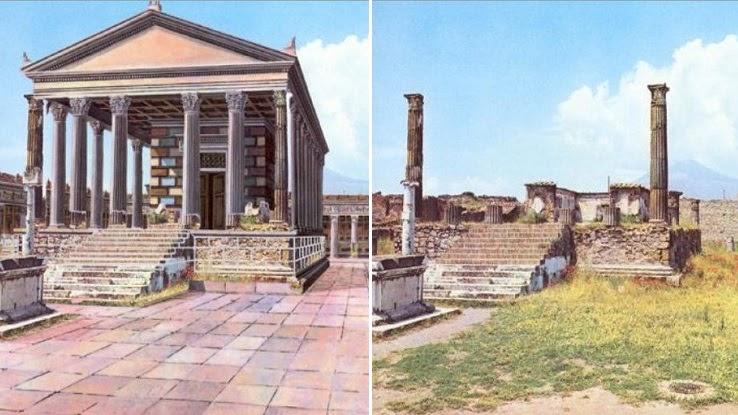
Since that fourth dimension, much of the historical site has been excavated. The volcanic harm to the city was all-encompassing, but a few buildings were successfully restored by archeologists. A trip to the landmark and a stroll through the ancient streets and dwellings gives visitors a 18-carat feeling of what life was similar centuries ago.
Disneyland, California
Disneyland may be the most dynamic theme park in the world, changing and adding attractions almost yearly since its opening in 1955. However, the park has been successful in maintaining the vision of its founder by keeping many of the classic attractions that made up the original venue, including Chief Street, Tomorrowland, Fantasyland and Frontierland.
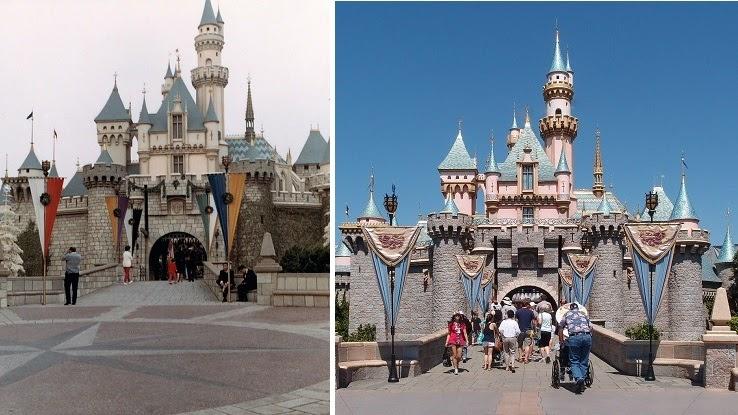
The new Disney California Adventure Park was opened in 2001, and more parks are planned for the future. Disneyland attracts an boilerplate of 44,000 people every twenty-four hours. The park celebrated its 60th anniversary in July 2015.
Berlin Wall, Germany
When the Berlin wall was constructed in 1961, the Communist government of Eastward Germany declared it a barrier to keep capitalism out of the Soviet-occupied zone. Of course, its more realistic purpose was to prevent Due east Germans from escaping to gratuitous West Germany. After Germany was divided into two states but before the wall was built, 3.vi million people fled to the west through Berlin.
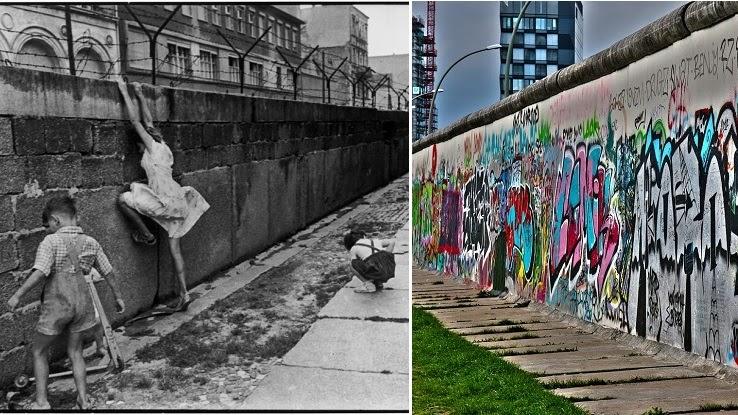
The wall extended for more than 96 miles. More than than 300 guard towers and barbed wire along the top discouraged E Germans from attempting to escape. Today, just pieces of the wall remain.
Hollywood Sign, Beverly Hills
Most people know Hollywood is the motion picture and goggle box capital of the world. Notwithstanding, few know that the district in Los Angeles was once called "Hollywoodland." The legendary sign congenital on Mount Lee in 1923 included the "land" lettering and was meant to concenter developers to the area for real estate investments.
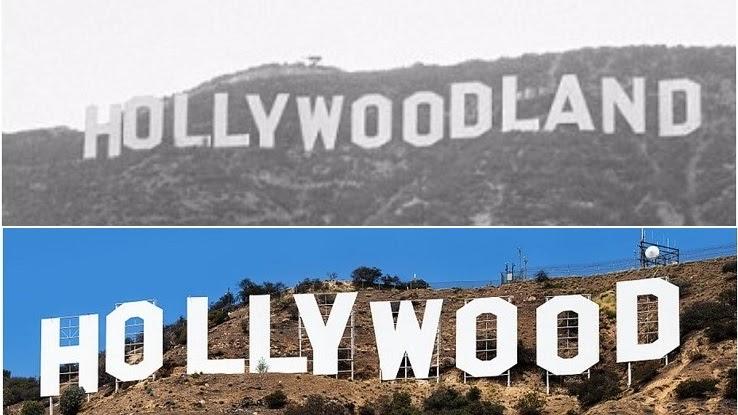
The letters of the original sign measured 50 anxiety tall and 30 feet wide. To light up each section — first separately and then together — required more than than four,000 light bulbs. Today, the iconic sign that reads "Hollywood" is i of the nearly recognized in the earth.
Mausoleum at Halicarnassus
Considered i of the Seven Wonders of the Ancient Earth, the Mausoleum at Halicarnassus was synthetic for Mausolus, the ruler of Caria (an ancient commune of southwestern Anatolia), and his queen Artemisia. Measuring 140 feet tall, experts believe the tomb was built between 353 and 350 BC.
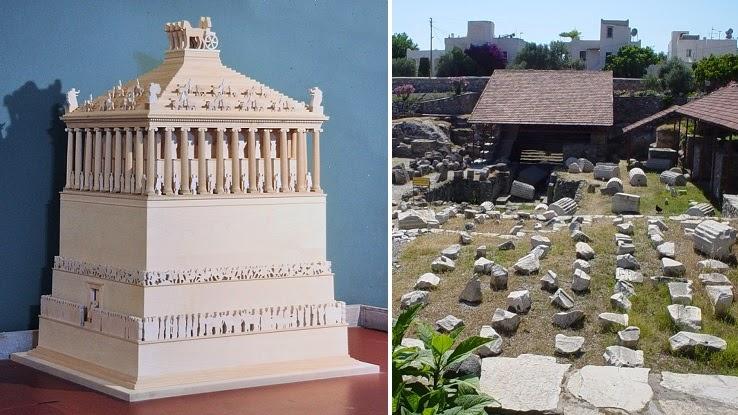
Historians believe the 3D model in the photo to exist a reasonable representation of the tomb's outside. The mausoleum was damaged by 13th century earthquakes and then entirely destroyed by crusaders in 1522 AD. All that remains today are pillar bases and rubble that indicate the building's one-time location.
Colosseum, Rome
In its prime, the Roman Colosseum, also known as the Flavian Amphitheatre, accommodated more than fifty,000 spectators and was about the size of an American football stadium. A souvenir to the Roman citizens, the venue was deputed by Emperor Vespasian around 70 Advert.
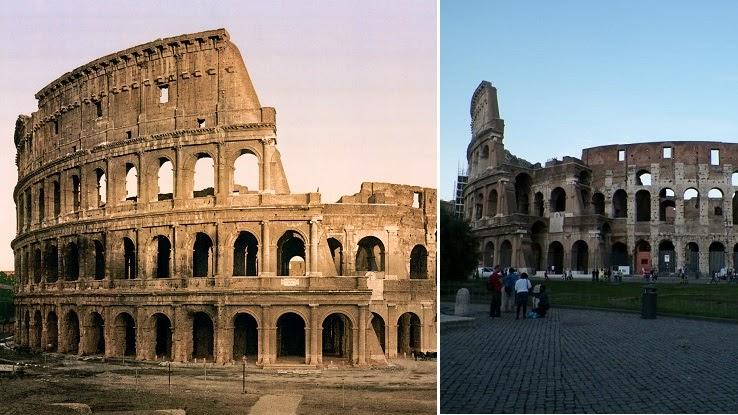
For centuries, the well-designed edifice was a site for entertainment, including wild animal combat, reenactments of famous battles, dramatic plays and gladiator matches. Although much of the original Colosseum has been destroyed by weather, natural disasters, erosion and neglect, it remains an essential reminder of ancient Roman history.
The Parthenon, Hellenic republic
3 temples, Athena Nike, Erechtheum and the Parthenon, grace the flat summit of the Acropolis, a rocky colina in the center of Athens. The Parthenon, built in the mid-5th century BCE, is the about ascendant and was defended to the Greek goddess Athena Parthenos, known equally "Athena the Virgin."
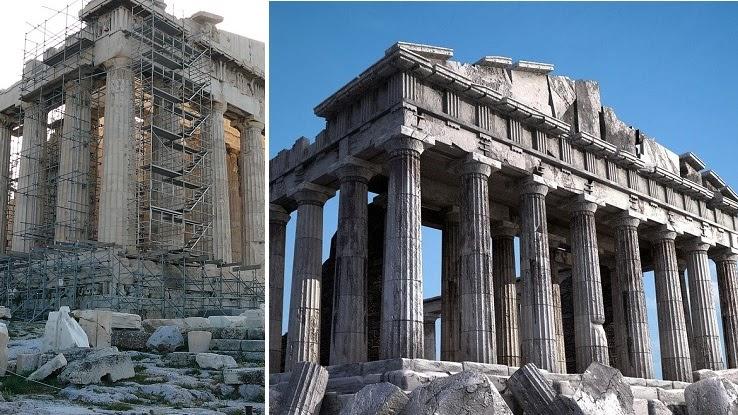
Although the regal, rectangular-shaped, white marble structure has suffered damage from fire and earthquakes over the centuries, the basic building structure has remained intact. Visualizing the original structure requires some imagination, but at least efforts are existence made to maintain the Parthenon in its present condition.
Angkor Wat, Kingdom of cambodia
The ultimate manifestation of Khmer genius, Angkor Wat is an inspirational temple and the largest religious monument in the world. Initially built for the Hindu god Vishnu during the Khmer Empire, it was afterwards converted to a Buddhist temple.
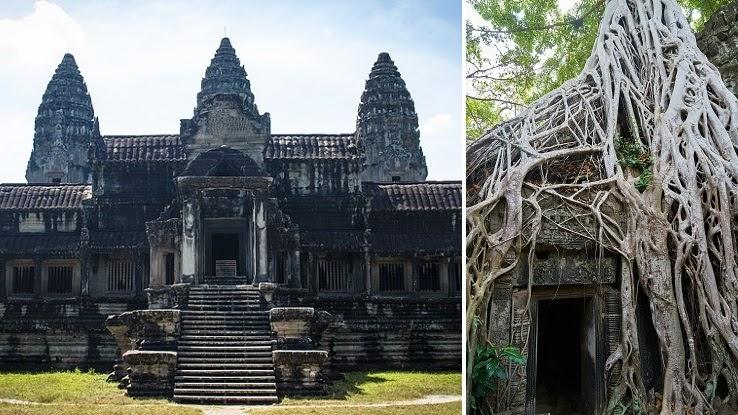
The temple is now a source of intense Cambodian national pride. As a result, the monument has remained in uninterrupted use since its construction in the commencement half of the 12th century. Despite its continuous service, the lavish construction that was once covered with artwork is at present mostly stone ruins with sections covered by overgrown trees.
Coba Nohoch Mul, Yucatán Peninsula
The pyramids congenital by the Maya civilization between 200 and 900 Advert differ from those constructed past the Egyptians, although they are similar in appearance. Congenital equally religious complexes, the Mayan structures demonstrate a diverseness of designs and styles. Egyptian pyramids were congenital to serve exclusively every bit tombs.
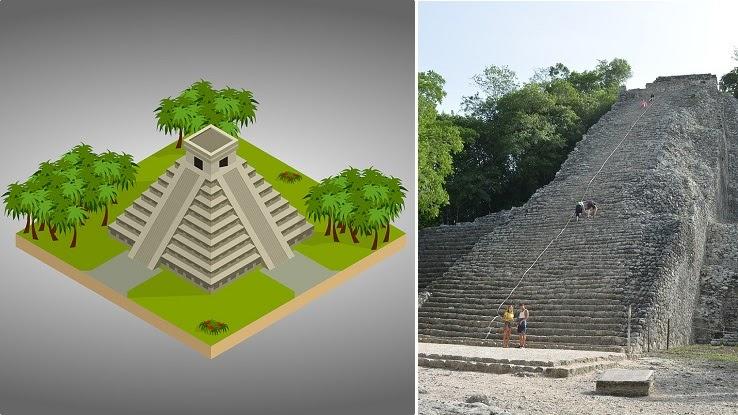
Every bit shown in the graphic, Mayan pyramids were constructed using stacked platforms featuring a central staircase climbing upwardly to a small temple at the meridian. What remains of Nohoch Mul are 120 well-worn steps that include a rope to make the climb and the descent safer.
Stonehenge, England
Although Stonehenge may look like a mere collection of large rocks placed in a circle, it is perhaps the world'south most famous — and nearly mysterious — prehistoric monument. Although its purpose is unknown, enough of theories have been offered by historians.
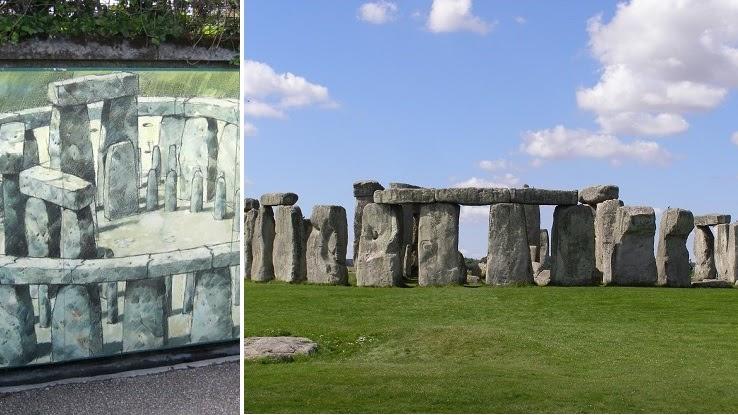
Is it a formation that was used to study the movements of the sun and moon? Did a race of giants position the stones, or did aliens use their superior applied science to create the formation? Maybe information technology was an ancient concert hall with excellent outdoor acoustics. Some have even suggested it was built every bit an ancient team-building exercise. Regardless of the purpose, Stonehenge has remained more often than not intact for centuries.
Statue of Liberty, New York City
A souvenir from the people of French republic to the U.S. following the American Revolution, the Statue of Freedom is a massive neoclassical sculpture that resides in New York Harbor. Designed by French sculptor Frédéric Auguste Bartholdi, the robed statue with a raised torch and stone tablet measures more than than 305 feet tall.
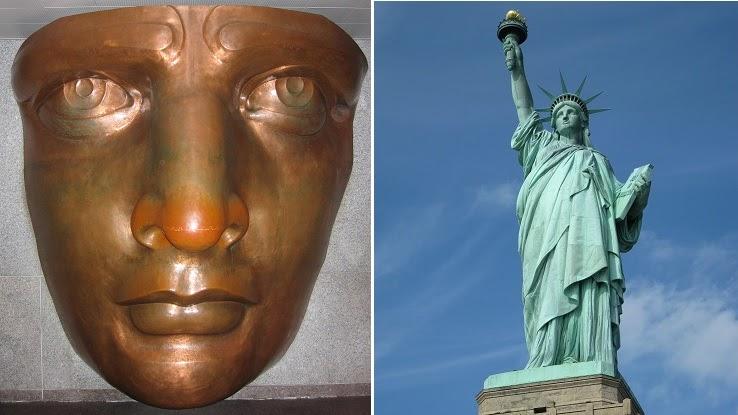
The figure is made of more than 200,000 pounds of copper. When Lady Liberty arrived in the U.S., she was the statuary color of copper, like a penny. However, cheers to fourth dimension and exposure to the elements, the copper oxidized, giving the statue its iconic blue-green color.
Eiffel Tower, Paris
The Eiffel Tower served equally the entrance and master exhibit of the 1889 Paris Exposition (World's Off-white). It was erected to memorialize the 100th anniversary of the French Revolution and to demonstrate French republic's industrial competence.
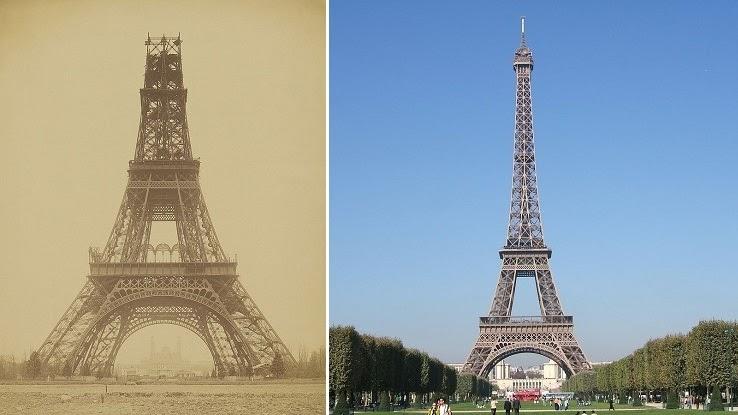
Located on the Champ de Mars, the structure is an fe lattice tower named afterward Gustave Eiffel, the engineer who designed it. The tower stands 324 meters to the very tip and took a little more than two years to complete. Initially built equally a temporary structure, information technology remained as a radiotelegraph station and survived to get the most iconic symbol in the Parisian skyline.
The Louvre, Paris
The Louvre is arguably the most meaning art museum in the world. Information technology hosts more visitors each twelvemonth than whatsoever other museum and offers a collection that includes works of fine art from ancient civilizations to the mid-19th century. The museum is housed in a castle that was synthetic several thousand years ago.
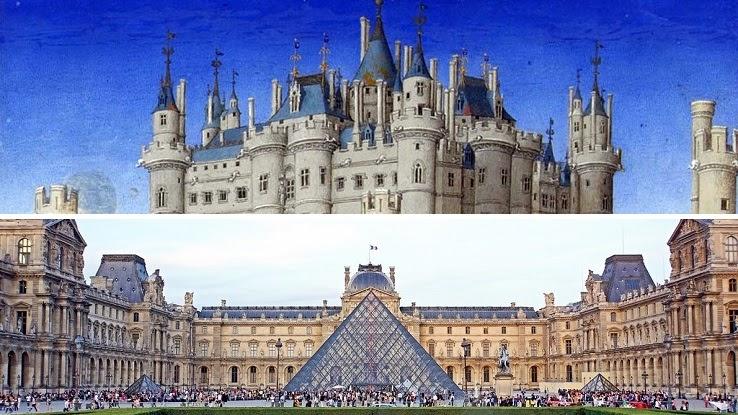
In the 1980s and 1990s, the Louvre building complex underwent a significant remodeling project intended to better the museum's accessibility and make it more accommodating for visitors. The remodel included adding the Louvre'due south controversial drinking glass pyramid that was widely criticized as a structural blueprint that was inconsistent with the aboriginal Louvre compages.
Buckingham Palace, London
Buckingham Palace was built in the 1700s and has been the official London residence of Great britain'due south monarchy since 1837. Tourists flock to the site by the thousands to watch the Changing of the Guard ritual that takes identify every morning. Household Troops have guarded the monarch and the royal palaces since 1660.
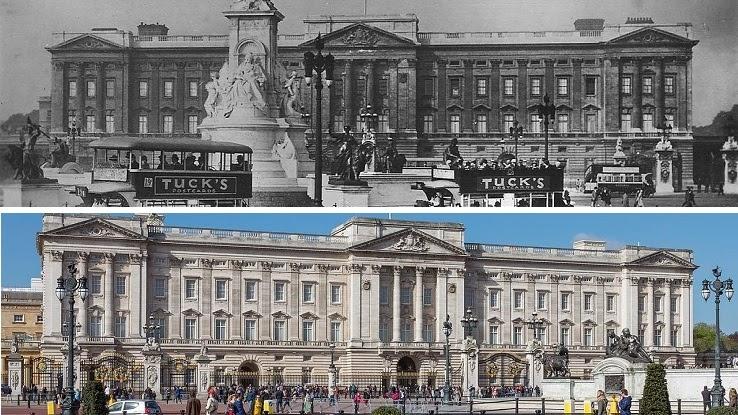
While the Palace has been maintained in the excellent condition you would wait of British royalty, it suffered some damage during Globe War II. When Germany bombed London, Buckingham Palace took several direct hits. Even so, it was restored to its former pristine condition and remains a major British landmark.
Space Needle, Seattle
Most electric current Seattle residents tin can't remember what the skyline was like before the Infinite Needle was congenital. But short of lx years old, it's the tallest structure westward of the Mississippi River.
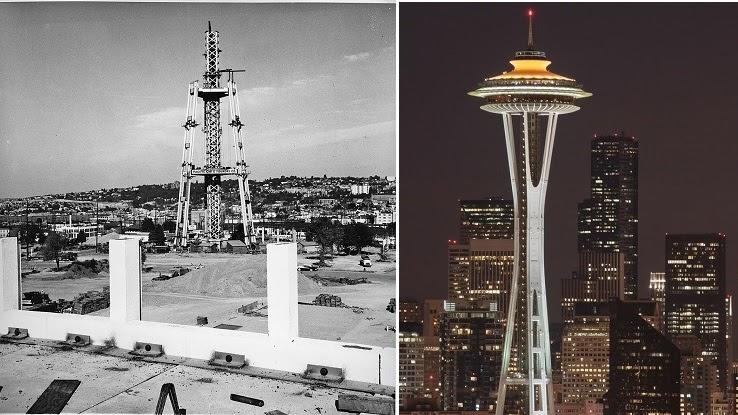
Built with modernistic engineering techniques, the Infinite Needle reaches a summit of 605 anxiety and resists winds upwardly to 200 mph every bit well as earthquakes up to a 9.1 magnitude. The towering structure attracted 2.three 1000000 visitors for its one thousand opening at the 1962 World'due south Fair. Visitors can ride the elevator to the ascertainment deck at the top in a mere 41 seconds.
Gateway Arch, St. Louis
Reaching the peak of the Gateway Arch by tram is no unproblematic task. Visitors must climb more than than 96 steps, stand and await for 30 to lx minutes and refrain from using the bathroom for quite some time since there are no restrooms at the top. Withal, for those who make information technology, the reward is a view to the east and west that stretches upward to thirty miles.
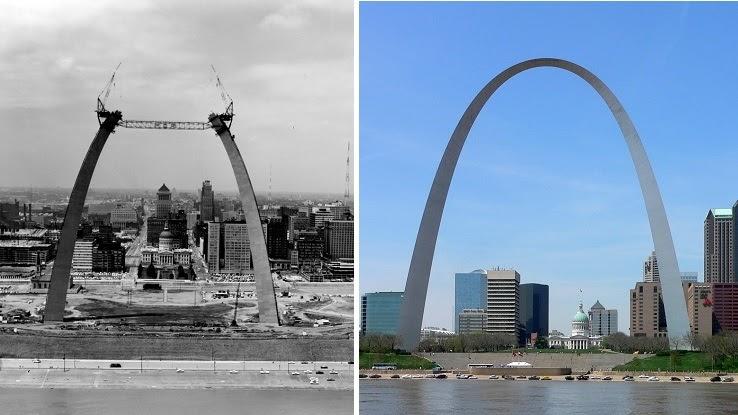
At a pinnacle of 630 feet, the structure is the tallest curvation in the world. In 1974, information technology placed fourth on the list of Most Visited Human-Made Attractions. It became a national landmark in 1987.
Chernobyl Swimming Puddle, Pripyat, Ukraine
The Chernobyl Nuclear Ability Plant became an infamous unintentional landmark on April 25, 1986, when an explosion resulted in high levels of radiations exposure throughout the surrounding area. Some areas in the nearby town of Pripyat will remain uninhabitable for thousands of years.
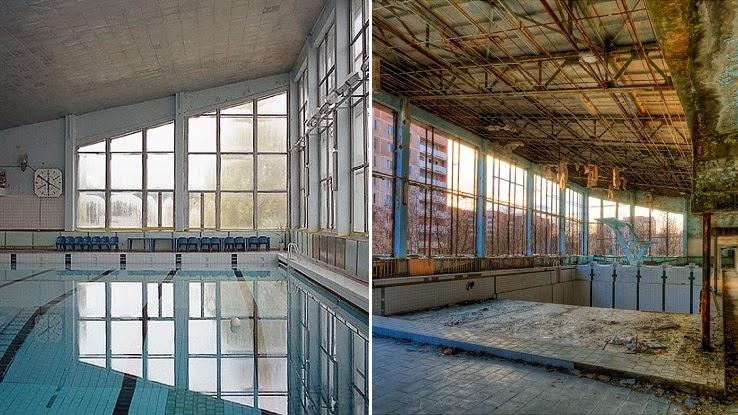
Ane of those areas includes the Azure Pond Puddle. Congenital in the 1970s, it was one of 3 popular indoor pond spots in the in one case bustling town. However, now the ruins of the puddle lie within the exclusion zone. It's illegal to live there, yet nearly 150 people still call it home.
World Trade Heart, New York City
No one will ever forget that fateful twenty-four hours on September xi, 2001, when the Twin Towers came downward, altering the New York City skyline forever. Although the World Trade Heart was composed of 7 buildings, the 2 iconic towers rose above nearly of the surrounding buildings and were identifiable from any part of the city.
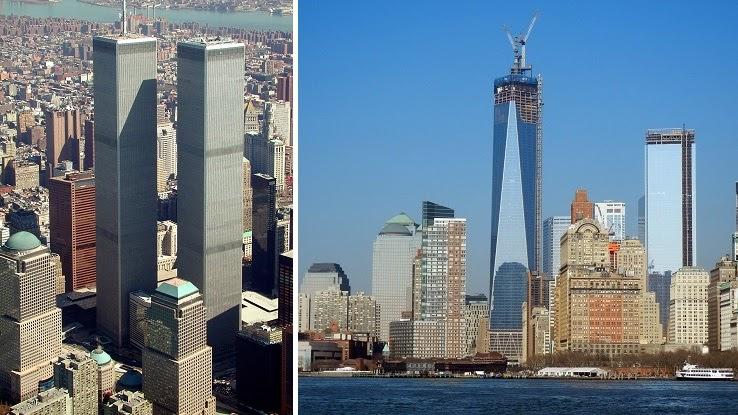
The missing landmark towers created an eerie void in the urban center for quite some fourth dimension, only a new tower at I Earth Trade Center was erected and opened in their place in 2014. The New York skyline was once again graced with a landmark skyscraper.
Dharahara Tower, Nepal
Kathmandu is famous for its many temples, including Pashupatinath, perhaps the country's most valuable Hindu temple. The noisy and vibrant capital metropolis, Nepal, as well has several important monuments equally well as one historical landmark that is no more.
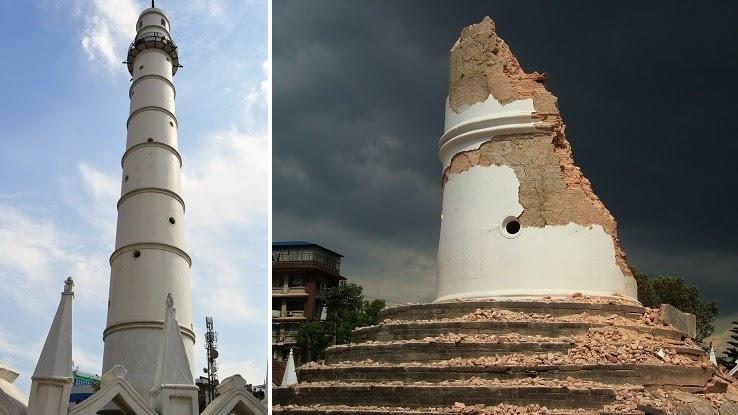
The spectacular Dharahara Belfry, built in 1932, rose 9 stories high, making it the highest structure in Nepal. A spiral staircase led visitors upward the 213 steps to the top, where a circular balcony provided a magnificent panoramic view of the Kathmandu Valley. The structure remained intact through multiple powerful earthquakes but collapsed when a 7.eight-magnitude earthquake struck the surface area in 2015.
Morandi Bridge, Genoa, Italy
Highway bridges are built to permit vehicle transportation over an otherwise impassable object, similar a river, bay or another highway. They are practical engineering marvels that can as well become popular landmarks for the pleasing view they add together to the landscape.
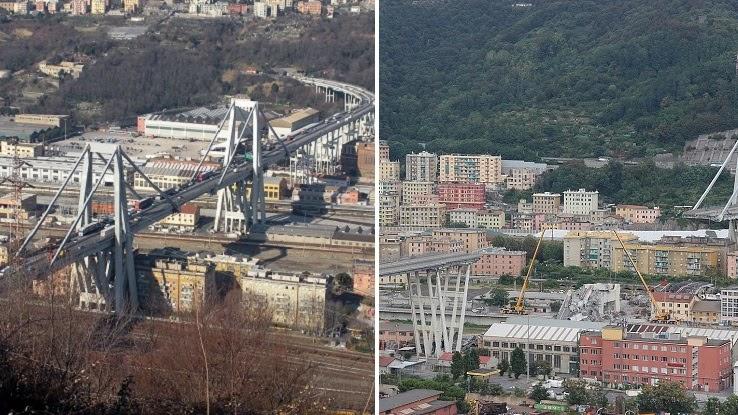
The Morandi Bridge in Genoa was one of those landmarks. Information technology served as a critical link from Italia to France and other parts of Europe via route A10 and connected 2 sections of the urban center that were separated by the Polcevera river. However, on August 14, 2018, the landmark bridge came crashing downward during a severe storm. The remaining construction has since been demolished.
Lincoln Memorial, Washington D.C.
Although Congress passed bills to commission a monument in Abraham Lincoln's honor two years later on his death, it took most 50 years for the monument to intermission ground. The original design was a bit exaggerated with 31 pedestrian statues, half dozen statues with an equestrian theme and a towering 12-human foot-loftier statue of the president.
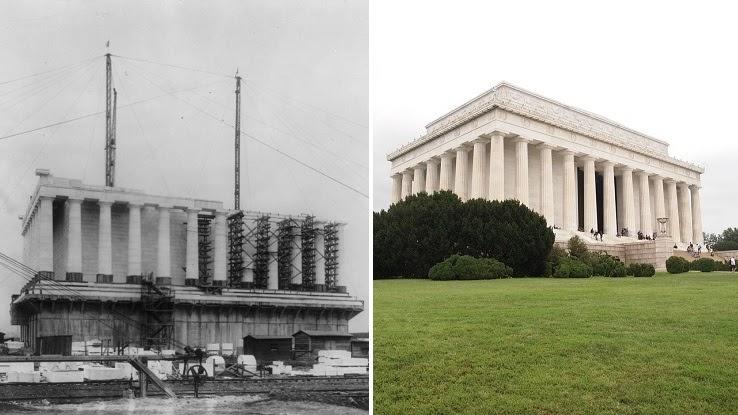
The final version was more than subtle, but it did include a reflection pool that extends to the Washington Monument. Many significant events have been held at the Lincoln Memorial over the years. Perhaps the most notable was Dr. Martin Luther King's "I Have a Dream" speech in 1963.
Taj Mahal, India
The Taj Mahal is a massive mausoleum made of white marble constructed in the mid-1600s by the Mughal emperor Shah Jahan in memory of his favorite wife. When the Mughal Empire fell in the late 19th century, the tomb fell into disrepair. However, just before 1900, Lord Curzon, the British Viceroy of India, ordered the Taj Mahal to be restored.
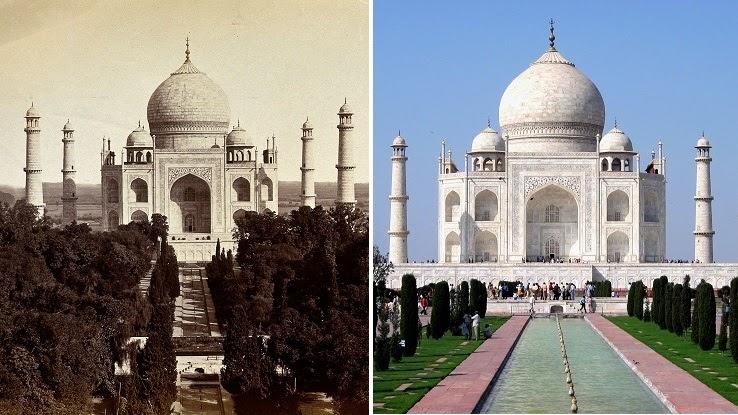
The mausoleum is considered a hub of Muslim art in Republic of india and an admired masterpiece of the globe'south heritage. Currently, the Taj Mahal is well maintained and hosts millions of visitors yearly, but it still suffers damage each twelvemonth, primarily from pollution.
Source: https://www.reference.com/geography/famous-landmarks-changed-over-time?utm_content=params%3Ao%3D740005%26ad%3DdirN%26qo%3DserpIndex
Posted by: francisstims1950.blogspot.com


0 Response to "How Does Junior Change In Part Time Indian"
Post a Comment